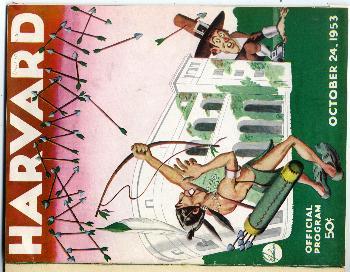When asked about the 1953 football season, then-captain Richard J. Clasby ’54 recalls that he often had difficulty obtaining enough tickets for all of his family and friends. A native of Natick and the leader of a team that managed a 6-2 record and, more importantly, a 13-0 victory over a heavily favored Yale team it had not beaten since 1948, Clasby said that the eight complimentary tickets given to him from the Harvard Athletic Association (HAA) were not enough to provide for all those close to him that wanted to attend the home football matches.
Clasby was not alone among the Harvard community who had difficulty obtaining tickets to football games. Excessively long lines and allegations of football managers scalping tickets and administrators giving preference to final club members created a stir around campus that year. Due to the frustrations created by the complicated and, at times, unfair ticketing procedures, investigations were launched into the matter and the Faculty Committee on Athletics worked to correct three main problems.
The new envelope system enacted during the 1954 football season eliminated the long waits for tickets by setting up a streamlined application process; eliminated the privilege granted to certain groups to secure large blocks of tickets before the season by allowing any group of up to ten undergraduates to submit their ticket requests together; and created punitive measures for those caught scalping.
The controversy surrounding the ticketing procedures began early in the year, when a letter from Dr. Neale C. Bringhurst ’51 appeared in The Crimson on Oct. 22.
In the letter, Bringhurst wrote that he had managed to obtain excellent seats to the Dartmouth football game by buying the free tickets given to one of the football managers from the HAA. Bringhurst went on to criticize as ineffective the honor system set up to prevent managers from selling their complimentary tickets.
“I was probably trying to get them in order to impress a girl,” Bringhurst recalls.
The undergraduate football manager during that season, Francis N. Millett, Jr. ’54, said at the time that accusations of scalping against “the football community are absurd and not worthy of comment.”
But in a recent interview, Millett said that though he was unsure of how widespread the abuse of the honor system was, he did recall that after the letter appeared in The Crimson, “I told [all the managers] that they’re not supposed to sell their tickets.”
Following the Bringhurst letter, Dean of the College Delmar Leighton launched an investigation into the ticket scalping issue, but he could not find conclusive evidence. Leighton’s search did reveal that Benjamin Jacobson, the owner of the Gold Coast Valeteria, had in fact been selling complimentary tickets.
After the Leighton investigation, the matter was turned over to the Athletic Committee, along with all of the other ticketing problems.
The final club controversy surfaced when the Ticket Manager for the HAA, Frank O. Lunden, admitted to having allowed members from certain clubs to buy blocks of tickets before they had gone on sale to the rest of the student body.
Though the ticketing change in 1954 created a system where all students could arrange to buy tickets next to their friends, no such plan existed during the 1953 season.
But all of the members of the final clubs contacted claimed that they did not remember the incident, or that the abuse was not as rampant as described.
“If I did get them, it was through the normal ticketing agencies, through the HAA,” said Eliot D. Hawkins ’54, the president of the Fly during the 1953-54 academic year.
“I don’t remember it at all,” said Reid B. Morrison ’54, former secretary of the Fox. “Not a single thing.”
After admitting the preferences granted to the clubs, Lunden said that he would not resume the practice the following season.
The third problem confronting the distribution of football tickets during the 1953 season seems to have affected the largest number of undergraduates, and prompted many to propose various plans to correct the situation during the middle of the season. The inefficient system used during the 1953 season required students to sometimes wait in lines for hours in order to obtain tickets, a problem which the 1954 resolution remedied—several letters to The Crimson in the fall of 1954 commented on the ease of purchasing tickets.
The general change to the system, which required students to drop off their application for tickets along with the money to the HAA nearly two weeks before game day—so that the tickets could be distributed equally—eliminated a lot of the waiting time. The proposals for this general change in the system were suggested as early as Oct. 8, 1953, when Dr. Martin H. Brownstein ’56 wrote a letter to The Crimson outlining a general plan.
Later on during the year, plans were drafted by both the Undergraduate Athletic Council and the Student Council to fix the ticketing problem, and were submitted to the Athletic Committee to create a situation that would improve the handling of tickets. After listening to the suggestions, the Committee came up with the envelope plan, and the controversy of the 1953 season seems to have now been mostly forgotten.
—Staff writer Evan R. Johnson can be reached at erjohns@fas.harvard.edu.
Read more in News
Sikh’s Sword Seized By School













